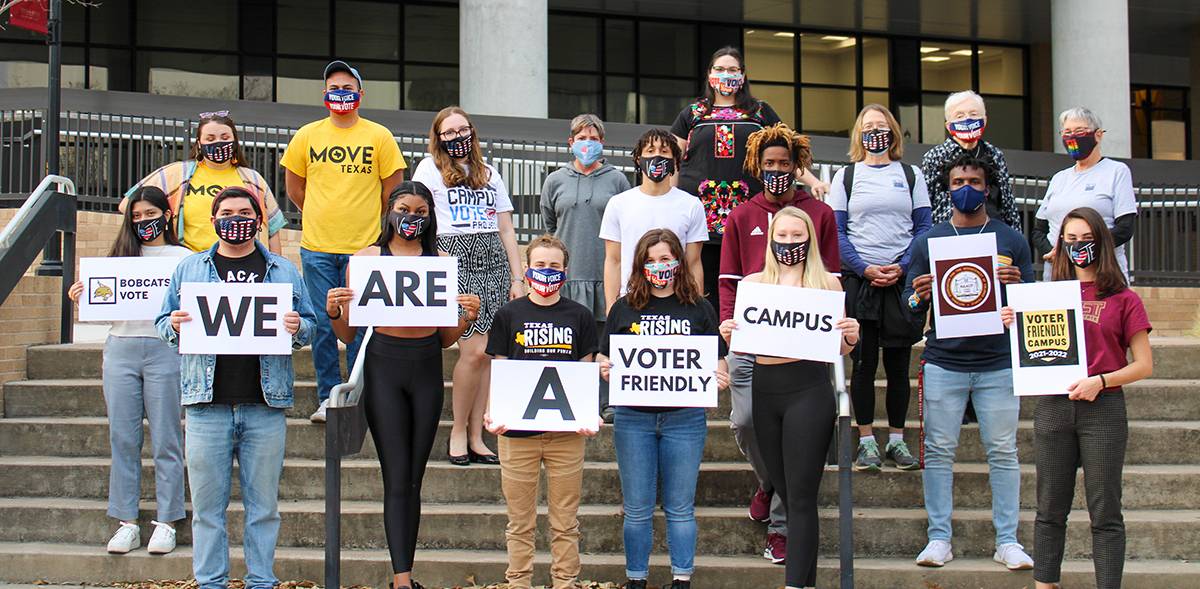Jayme Blaschke | March 10, 2021

Texas State University has been designated a “Voter Friendly Campus” through an initiative led by the national nonpartisan organizations Fair Elections Center’s Campus Vote Project (CVP) and the National Association of Student Personnel Administrators (NASPA) – Student Affairs Administrators in Higher Education.
The designation is based on Texas State’s nonpartisan, university-wide and inclusive programming and events that encouraged students to register and vote in the 2020 elections and beyond.
In preparation for the 2020 elections, Texas State President Denise M. Trauth formed an elections task force in August 2020 with 25 faculty, staff and student members. Sherri Benn, assistant vice president for institutional inclusive excellence for student initiatives, chaired the task force which developed a plan to proactively prepare the university community for the elections and promote constructive interactions through the election season.
“Voter Friendly Campus” was one of six elections task force subcommittees and was charged with implementing strategies, in collaboration with the other five subcommittees, to provide opportunities for engagement in respectful discourse, promotion of voting and civic engagement, preparation for election night and post-election processing. Graduate student Catherine Wicker and Vincent E. Morton, associate vice president for student affairs and dean of students, co-chaired the subcommittee, Student Government Senator Patrick Maloney was a task force member, and undergraduate students Kalin Garcia and Jessica Myers were Democracy Fellows. Bill DeSoto, professor of political science, and Jennifer Lamm, lecturer in political science, were faculty advisors for the subcommittee.
“This was really a holistic approach, beginning with our students working to increase the number of voting machines and extend early voting days at the university, to providing support after the election,” Wicker said. “The effort was student-led and student-centered, and had support from a variety of departments and organizations across the university community. I am especially proud that a team of nine student groups with diverse views worked together. We are doing something right when our students are willing to come together to help make sure that their peers have the right to vote.”
The subcommittee also partnered with nonpartisan outside groups including the League of Women Voters and MOVE Texas to share voter guides with students.
More than 1,770 people were registered to vote due to the actions of the Voter Friendly Campus subcommittee which included holding candidate town halls, creating a voting information website, staffing voter registration events across campuses including a drive-up voter registration, and literature drops to residence halls and apartments in San Marcos.
“This accomplishment is a testament to Catherine’s vision and the innovation and hard work of our students,” said Benn. “It also shows what can happen when students come to us with ways to further enhance the reputation of their university, and our university answers with collaborative partnerships and support. I’m proud of how we all came together to bolster efforts that help students overcome barriers to participate in the political process and prepare them to be life-long engaged participants in our democracy.”
Texas State students encouraging others to register to vote, October 2020
About Voter Friendly Campuses
More than 231 campuses in 37 states and the District of Columbia have received the Voter Friendly Campus designation. The institutions designated Voter Friendly Campuses represent a wide range of two-year, four-year, public, private, rural and urban campuses. Notably, the list of designated institutions includes many minority serving Institutions and Historically Black Colleges and Universities. The program is ultimately serving over 3.5 million students.
Share this article
For more information, contact University Communications:Jayme Blaschke, 512-245-2555 Sandy Pantlik, 512-245-2922 |
